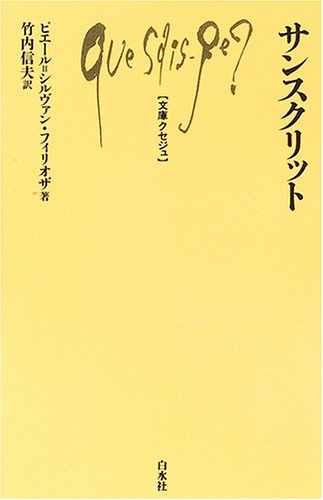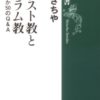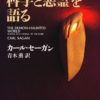
梵語
私は、サンスクリットは学術(仏教?)のための「作られた」言葉だと思っていました(エスペラントのようなものだと思ってました)。でも、最近、「どうやら話されていたらしい」という感じがしてきたので読んでみました。
この本は、サンスクリットの文法書ではありません。サンスクリット語の歴史や文献を通じて「言語」や「文化」、あるいは人間の「思考」そのものに迫る「哲学書」にも近い本です。
『サンスクリット文法―古代インド語のプロムナード』(湯田豊著)をいっしょに図書館から借りてきましたが、こちらはほぼ純粋な文法書です。
どうやらサンスクリットを「母語」とする人がかつていたようです(Wikiによると今でもいるとかいないとか)。そして「梵字」ももともとあった字で、それがサンスクリットを記すものとして定着したのはかなり後期なようです。
ラテン語
ヨーロッパでは、最近までラテン語が「公用語」のようなものでした。本(学術書)はラテン語で書かれていましたし、「学問」をする人は「ラテン語の読み書き」ができることが最低条件でした。日本では「漢文の読み書き」ができることが最低条件でしたね。
ラテン語はイタリア語の基礎となった言葉ですが、現在のイタリア語とはかなりちがっているそうです(「ギリシャ語と現代ギリシャ語はどう違いますか。」)。
古典ギリシャ語は当時の地中海沿岸の地域の共通語でしたが、もともとはアテネの付近の一地方の言語だったようです。でも、当時はイタリアからギリシャ、中東、エジプトまでの公用語でした。『聖書』も古典ギリシャ語で書かれました。
今は英語(というより「米語」)が「共通語」(スタンダード)でしょうか。それがアメリカの優位になるかどうかはわかりませんが、植民地で強く行われるのは宗主国の言葉を押し付けることです。
言葉と文字
今は小学校でも英語を教えるそうですが、どういうふうに教えるのでしょうかね。りんごの絵を見せて「アポー」とか教えるのでしょうか。それとも「こんにちははヘロー」とか教えるのでしょうか。難しいですよね。子どもたちは「ヘロー!ハウアーユー!」とか言うとおじいちゃんが「すごいねえ」と感心してくれるのが嬉しいかもしれません。藤原正彦氏(『国家の品格』)じゃないですけど、ちゃんと状況に合わせて「こんにちは」とか「げんき?」とか言えることのほうが大切かもしれません。
そもそも「Hello」といったり「こんちは~」と言ったりする時は「声」です。そしてそれは何か「気持ち」や「考え」を表現するということです。そのときに、頭の中で「言葉」で考えますか。考えるとすれば、何語で考えますか。「母語で考える」と思ってしまいますが、そうでしょうか。
私は英語が苦手なので、英語で考えようとすると途端に自分が小さい子供になったような気がします。中学・高校と6年間勉強したけど、私の英語能力は3歳児以下なのではないでしょうか。
ケーキを見て「美味しそう」「食べたい」って思うとき、ドラマのように心のなかで「言葉で」考えているでしょうか。多分、違うと思います。「美味しそう」「食べたい」と思うときには日本語もいらないし、言葉もいりません。
例えば、子供がケーキを指差したとき、「あっ、ケーキが食べたいんだ」と思いますよね。言葉はいりません。指差せばいいのです。
今の御時世で言えば、子供がマスクをしていない人を指差したときにどう思いますか。「あっ、マスクしていない。いけないんだ〜」って思いませんか。でも、「いけないんだ〜」って思っているのは、子供じゃなくてそう考えている大人自身ですよね。自分が「悪いと思っている」あるいは「悪いと言われるに違いない」と思っているから、子供の指差しにそう思うのです。
言葉というのは何か「思っていること」「伝えたいこと」があって、それを「語彙(単語)」と「文法(規則)」に則って言葉(あるいは文字)にして、受け手はその言葉(あるいは文字)をその規則によって「解釈」して「わかる(理解する)」と考えがちですが、そう簡単なことではなさそうです。
サンスクリットを使う知識人(「パンディット」)はそういうことを突き詰めて考えたようです。言葉が持つ「不思議さ」は「神聖さ」となり、神(ブラフマン)となります。そしてその仕組、文法は世界の成り立ちそのものです。
文法を自覚すると、文法に則って話をするものだと思ってしまいます。「伝えたいこと・思い」があって、言葉があるのではなくて、まず文法という「構造」がある=構造主義、というわけではありませんが、形式論理(や数学)と似たようなところがあります。「人間が言葉を創った」というより「言葉が人間を創った」と言ったほうがいいような気がしてしまいます。「人間が神を創った」と「神が人間を創った」の関係と逆のようです。「始めに言葉ありき」で神と言葉は同じなのに。
言葉から導かれた文法に言葉が拘束されるということ。それは、病気の原因としてウィルスや細菌が導き出されたのに、ウィルスが検出されたから病気だという構造ととても似ています。
パンディット
サンスクリットの文化は書物(文字)中心の文化ではないそうです。人間の記憶(記録じゃない)の文化です。これは西洋の文化とは好対照ですよね。
記録がないということは歴史がないということです。歴史がないということは「始まり・終わり」「発達」「進化」ということもありません。
パンディットは自分は正当な伝承者であり、解釈者であって、革新性を主張しないようです。それも西洋文化(あるいは中国文化)と異なりますが、ソクラテスも老子も孔子も著作を残していません。「伝わっていない」のではなく「書かなかった」のではないでしょうか。釈迦牟尼もイエス・キリストも著作を残していません。証拠の不在は不在の証拠ではありませんから、本当のことはわかりませんが、著作を残したのは彼らの弟子たちです。
文字が成立(確立)するためには、現実(具体)から離れる必要があります。「私」を成立させるには「私を離す」「私から離れる」、つまり「客体化」する必要があります。言葉自体が一つの抽象化(一般化)作用ですが、それは話し手の具体的な存在と時間的にも空間的にも切り離せません。でも、文字は違います。それは書き手から時間的にも空間的にも切り離されることで成立します。切り離されることで「書き手」という個人(個性)が成立し、「読み手」という個人(個性)が成立します。
書物ができると同時に「記録」は「記憶」を超えます。どんなに記憶力のいいパンディットがいたとしても、1万冊、1億冊の書物にはかなわないでしょう。
私などは最近1分前のことも忘れるので、なるべくメモをとるようにしています。まあ、忘れても99.99・・・%は必要のないことですが。
そのくせ、「りんご」一つを記述するのにどれだけの本が必要かはわかりません。古今東西かぎりなく「愛」について書かれた本がありますが、「愛」を書ききった本はありません。そしてこれからも書き続けられるでしょう。
再生産
オリンピックの放送で、「絶対王者中国」とか「日本のお家芸」とかよくアナウンスされます。でも、20年前、30年前の選手が引き続き出場していることはないでしょう。今大会で出場している選手も「オギャー」と言って生まれ、練習し強くなってきたのです。そして必ず引退します。その後別の選手が登場してきます。
言語も同じです。宗教や思想も永遠に仏陀やアリストテレスが生き続けるわけではありません。常に再生産されるのです。再生産に於いては「同じもの」が生産されるとはかぎりません。「昨日の私」と「きょうの私」は違います(だから作るものも違います)。「自己同一性」という時間(空間)を超越したものはないのです。それがあるかのように前提すること、それが文字の前提であり、文字がもたらしたものです。
パンディットが「注釈者」であり続けようとし、個性を隠蔽するのは、それを知っているからかもしれません。「正統的なパンディットは、近代の文献学者とはまったく異なった存在である。近代の文献学者は、古代の文献の意味を、その原作者の意識においてどうであったのか、その時代の知的環境のなかでどうであったのかという視点に立って、考察しようとする。また、努めてそこにみずからの解釈を介入させない。」(P.119)
解釈
さて、どうでしょうか。近代において「批評家(評論家、あるいは解説者)」という職業があります。私には画家崩れが絵の批評家になったり、小説家崩れが評論家になったりしているんじゃないか、という気持ちがありました。そんな暇があったら絵を描けよ、小説を書けよ。読者は小説を読んだほうがいい、絵を観たほうがいい、紙の無駄だ、とまで思っていました。
でも、今は違います。小説家は一人で作品を創るわけじゃありません。日本語や文字や原稿用紙をすべて自分で作るわけじゃないし、小説を書けるまで育ったのも自分だけの結果ではありません。
そしてなによりも作品は作者の手を離れることで成り立つのですから、そこには作者の意図が100%表現されているわけじゃないし、作者が意図する以上のものが表現されているのです。作品に意味をもたせるのは作家であると同時に読者です。読者や鑑賞者も創作者なのです。というか、「製作者」「鑑賞者」といった区別は意味がないのです。
子供の指差しは子供が「表現者」で親が「受容者」でしょうか。私は違うと思います。
この本の著者は、現代から自分という主体として「客体としての」サンスクリットを解釈していないのでしょうか。
「現在」と「過去」を区別(対立)させないこと。「主体」と「客体」を区別(対立)させないこと。そのヒントがサンスクリットにはあるように思いました。
とても楽しく読ませてもらいました。
久しぶりにクセジュを読んで感じましたが、句読点がコンマとピリオドになっているのは非常に読みにくいです。老眼には区別が付きません。(^_^;)
〈書抜〉
「サンスクリットはパーニニの時代に固定されたとよく言われる。そして、そうなったのはパーニニという文法家のせいであると言われる。また、サンスクリットはパーニニの文法書によっていわば死語になったということも言われる。実際には、パーニニが行ったのは、サンスクリットを使う人たちに、サンスクリットの語や文を生成する構造に対して明確な意識を与える(FF)ということだった。言語学的意識を持たずに言語を用いることとどのようにそれが生成されるかを自覚して用いることとは同じではない。明確に規定された言語意識を持つことで、話し手はみずからの言語行為を制御できるようになる。」(P.38-39)
「教師のなかには、書物を使わないことを誇りとするものもいる。少なくともヴェーダの伝授には書物を使わないのが原則だ。書物のなかにある知識を嘲ることわざがあるーー書物のなかの知識は他人のポケットにあるお金と同じだ。必要なときに用立てることができない。(LF)だからといって書物が使われないわけではない。パンディットたちは記憶を徹底的に利用するが、書物の効用を無視するわけではない。書物は人間の記憶を拡大するのに役に立つからだ。」(P.91)
「すぐれた人は妬む心を持たずに他の人から学ばなければならない。なぜなら世界は、知性のあるものには師であり、知性なき者には敵であるからだ。」(P.112)
「書かれた文字による表現、読まれる文字によるコミュニケーションという観念は不在だ。サンスクリットのカーヴィヤは、書記文字の芸術ではなく、音声言語の芸術なのである。」(P.138)
「しかし、彼はむしろ自分の革新性や独自性を隠蔽しようとするのである。」「義務〔ダルマ〕の前に個人性は消え去るのである。」(P.120)
〈メモ〉
「共通語」
方言
標準・汎用・普通
女だからか、この社会だからか、境界はわからない
盲目だからすごいのか、盲目だから許されるのか
⟨impressions⟩
Sanskrit
I thought Sanskrit was a "made" word for scholarship (Buddhism?) (I thought it was like Esperanto). But recently, I felt that it was being talked about, so I read it.
This book is not a Sanskrit grammar book. It is a book close to a "philosophy book" that approaches "language" and "culture" or human "thinking" itself through the history and literature of Sanskrit.
"& lt; a href = & quot; https://www.amazon.co.jp/dp/4475018803/?tag=charmedias-22" target = & quot; _blank & quot; & gt; Sanskrit Grammar-Ancient Indian Promenade I borrowed "& lt; / a & gt;" (written by Yutaka Yuda) from the library, but this is an almost pure grammar book.
It seems that there used to be people who used Sanskrit as their "mother tongue" (according to the Wiki, it's still there or not). And it seems that it was quite late that "Sanskrit" was originally a character that was established as a description of Sanskrit.
Latin
In Europe, Latin was like an "official language" until recently. Books (academic books) were written in Latin, and the minimum requirement for "academic" learners was to be able to "read and write Latin". In Japan, the minimum requirement was to be able to read and write Chinese texts.
Latin is the basic language of Italian, but it seems to be quite different from the current Italian ("What is the difference between Greek and modern Greek? /detail.chiebukuro.yahoo.co.jp/qa/question_detail/q1243651967) ").
Classical Greek was a common language in the Mediterranean region at the time, but it seems that it was originally a regional language near Athens. But at that time it was the official language from Italy to Greece, the Middle East and Egypt. The Bible was also written in classical Greek.
Is English (or rather "American") the "common language" (standard) now? I don't know if it will give America an edge, but what is strongly done in the colonies is to impose the words of the suzerain.
Words and letters
It seems that you teach English in elementary school now, but how do you teach it? Do you show a picture of an apple and teach it "appo"? Or do you teach "Hello Hello"? It's difficult, isn't it? Children may be happy to say "Hello! How are you!" And Grandpa will be impressed with "Wow!". It's not Mr. Masahiko Fujiwara ("Dignity of the Nation"), but depending on the situation, "Hello" or "Genki" It may be more important to say "?".
In the first place, when you say "Hello" or "Hello", it is "voice". And that is to express something "feelings" or "thoughts". At that time, do you think in "words" in your head? If so, in what language do you think? I think "think in your mother tongue", is that so?
I'm not good at English, so when I try to think in English, I feel like I've become a small child. I studied with junior high school and high school for 6 years, but I think my English ability is less than 3 years old.
When you look at a cake and think "it looks delicious" or "wants to eat", do you think "in words" in your heart like a drama? Probably not. When I think "it looks delicious" or "I want to eat", I don't need Japanese or words.
For example, when a child points to a cake, he thinks, "Oh, I want to eat the cake." I don't need words. All you have to do is point.
In today's world, what do you think when a child points to someone who is not wearing a mask? Don't you think, "Oh, I'm not masking. I can't." However, it is the adults who think so, not the children, who think "I can't do it". Because I think I'm "bad" or "must be said to be bad," I think so when pointing at my child.
What is a word? There is something "what you think" and "what you want to convey", and make it into words (or letters) according to "vocabulary (words)" and "grammar (rules)". Recipients tend to think that the word (or letter) is "interpreted" and "understood (understood)" according to the rules, but it seems that it is not so easy.
Intellectuals who use Sanskrit ("Pandhita") seem to have thought about such things. The "mystery" of words becomes "sacredness" and becomes God (Brahman). And the mechanism and grammar are the very origin of the world.
When you become aware of grammar, you think that you speak according to grammar. There is "what I want to convey / thought", not words, but first there is a "structure" of grammar = structuralism, but there is something similar to formal logic (or mathematics). .. I feel that it is better to say "words created humans" rather than "humans created words". It seems to be the opposite of the relationship between "human beings created God" and "God created humans". Even though the word is the same as God in "there is a word in the beginning".
Words are bound by the grammar derived from them. It is very similar to the structure in which a virus or bacterium is derived as the cause of a disease, but the disease is detected because the virus is detected.
Pandhita
Sanskrit culture is not centered around books (letters). It is a culture of human memory (not records). This is in sharp contrast to Western culture, isn't it?
No record means no history. The lack of history does not mean "beginning / end", "development", or "evolution".
Panddhita seems to be a legitimate folklore, an interpreter, and no claim to innovation. It is also different from Western culture (or Chinese culture), but neither Socrates nor Laozi nor Confucius have written. Isn't it "not written" rather than "not transmitted"? Neither Shakyamuni nor Jesus Christ left a work. The absence of evidence is not evidence of absence, so I don't know the truth, but it is their disciples who left the work.
In order for a character to be established (established), it is necessary to move away from reality (concrete). In order to establish "I", it is necessary to "separate me", "separate from me", that is, "objectify". The word itself is an abstraction (generalization) action, but it is inseparable from the concrete existence of the speaker both temporally and spatially. But the letters are different. It is established by being separated from the writer both temporally and spatially. By being separated, an individual (individuality) called "writer" is established, and an individual (individuality) called "reader" is established.
At the same time as a book is made, "record" exceeds "memory". No matter how good your memory is, you can't beat 10,000 or 100 million books.
I forget about a minute ago recently, so I try to take notes as much as possible. Well, even if you forget it, 99.99 ...% is not necessary.
I don't know how many books are needed to describe one "apple". There are books about "love" in all ages, but there is no book that says "love". And I will continue to write.
Reproduction
Olympic broadcasts often announce "absolute champion China" or "Japanese specialty". However, players from 20 or 30 years ago will not continue to participate. The players who participated in this tournament were also born by saying "Ogya", and they practiced and became stronger. And I will definitely retire. Then another player will appear.
The language is the same. Religion and thought do not mean that Buddha and Aristotle will live forever. It is always reproduced. In reproduction, the "same thing" is not always produced. "Yesterday's me" and "Today's me" are different (so what you make is also different). There is nothing that transcends the time (space) of "self-identity." Assuming it as if it were, that is the premise of the character, and what the character brought about.
Pandhita tries to remain an "annotator" and hides his personality, perhaps because he knows it. "Orthodox philologists are completely different from modern philologists. What modern philologists were about the meaning of ancient literature in the consciousness of its original author, the intellectuals of that era. I will try to consider it from the perspective of how it was in the environment, and I will endeavor not to intervene in my own interpretation. ”(P.119)
Interpretation
Well, how about it? In modern times, there is a profession called "critic (critic or commentator)". I had the feeling that the painter collapse became a critic of the painting, and the novelist collapse became a critic. If you have time like that, draw a picture, write a novel. Readers even thought it was better to read the novel, to see the picture, and to waste paper.
But now it's different. Novelists do not create works by themselves. I don't make all the Japanese, letters, and manuscript paper myself, and it's not just my own result that I grew up to be able to write novels.
And above all, the work is made up of leaving the author's hands, so the author's intention is not 100% expressed, and more than the author's intention is expressed. There is. It is the writer as well as the reader who makes the work meaningful. Readers and viewers are also creators. In fact, the distinction between "producer" and "viewer" is meaningless.
Is the child pointing to the "expressor" and the parent the "receptor"? I think it's different.
Isn't the author of this book interpreting Sanskrit "as an object" as the subject of himself from the present day?
Do not distinguish (conflict) between "present" and "past". Do not distinguish (conflict) between "subject" and "object". I thought Sanskrit had that hint.
I enjoyed reading it very much.
⟨Extracted⟩
"Sanskrit is often said to have been fixed in the days of Panini, and it is said that it was due to a grammarist named Panini. Also, Sanskrit became a dead language according to Panini's grammar book. In fact, what Panini did was to give Sanskrit users a clear awareness of the structure that produces Sanskrit words and sentences (FF). Using a language without grammatical awareness is not the same as using it consciously of how it is generated. By having a clearly defined linguistic awareness, the speaker is self-sufficient. You will be able to control your language behavior. ”(P.38-39)
"Some teachers are proud not to use books. At least, in principle, they do not use books to teach Vedic. There is a saying to mock the knowledge in books." -Knowledge in books is the same as money in someone else's pocket. You can't use it when you need it. (LF) That doesn't mean that books aren't used. Pandits make good use of their memories. However, we do not ignore the utility of books, because books help to expand human memory. ”(P.91)
"A good man must learn from others without jealousy, because the world is a teacher for the intelligent and an enemy for the non-intelligent." (P.112)
"The idea of written expression and readable communication is absent. Sanskrit's Kavya is not the art of written letters, but the art of vocal language." (P.138)
"But he rather tries to hide his innovation and uniqueness." "Individuality disappears before his duty [Dharma]." (P.120)
⟨Memo⟩
"Common language"
Dialect
Standard / General purpose / Normal
I don't know the boundaries, whether it's a woman or this society.
Is it amazing because I am blind, or is it forgiven because I am blind?
[著者等(プロフィール)]
竹内/信夫
1945年生。1970年東京大学文学部卒。1976年東京大学大学院人文科学研究科中途退学。東京大学大学院総合文化研究科(比較文学比較文化)教授。フランス文学・比較文学比較文化専攻
「完成された言語」を意味するサンスクリットは、インドにおけるあらゆる知的活動を数千年にわたり支えてきた。現在もインドの公用語のひとつであるが、日常語としての話者はほとんどいない。
本書は、その歴史と構造を紹介するとともに、長い生命力・不変性・聖性という特徴について解説してゆく。サンスクリット文法家たちは、その考察を哲学的次元へと高めてゆき、「言葉がブラフマン(梵)であり、意識はそこから生まれるものにすぎない」という境地に達する。彼らによって浄化と贖罪の言語となったこの言葉の有り様がわかりやすく述べられている。
本書は、その歴史と構造を紹介するとともに、長い生命力・不変性・聖性という特徴について解説してゆく。サンスクリット文法家たちは、その考察を哲学的次元へと高めてゆき、「言葉がブラフマン(梵)であり、意識はそこから生まれるものにすぎない」という境地に達する。彼らによって浄化と贖罪の言語となったこの言葉の有り様がわかりやすく述べられている。


